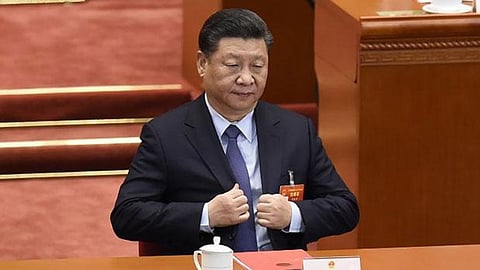
- Home
- न्यूजग्राम
- NewsGram USA
- India
- World
- Politics
- Entertainment
- Culture
- Lifestyle
- Economy
- Sports
- Sp. Coverage
- Misc.
- NewsGram Exclusive
- Jobs / Internships

Chinese President Xi Jinping gears up for a visit to Italy this week amid mounting speculation that he could meet with Pope Francis to further relations between the Catholic Church and Beijing.
Foreign ministry spokesman Geng Shuang declined to elaborate on Xi'splans when pressed at a news conference on Monday.
But he said the ruling Chinese Communist Party wants to "promote …forward development" following an interim agreement signed with the Holy See last September on the appointment of bishops.
"This is an important phased achievement of the two sides in the process of improving relations," Geng said.
"The Chinese side is willing to continue to move with Vatican in the same direction, conduct constructive dialogue … and promote the constant and forward development of the relationship," he said.
Xi's official schedule indicates he will make a state visit to Italy, Monaco and France from March 21-26.
Foreign ministry spokesman Geng Shuang declined to elaborate on Xi's plans when pressed at a news conference on Monday. Wikimedia
According to the official Vatican website, during the visit of Xi Jinping to Italy, the pope will host a religious event on the 24th, but has no other public engagements scheduled.
Reuters quoted a senior Vatican source as saying that the pope is willing to meet Xi and that the president's intermediaries have made overtures to the Vatican, with another source suggesting the meeting could be arranged "at the last minute."
On March 14, Italy's Corriere Della Sera newspaper said the pope couldpotentially meet Xi outside the walls of the Vatican City, in spite of there being no diplomatic ties between the Holy See and Beijing.
'A huge deal'
Such a meeting would be the first in history between a Chinese leader and a pope.
Professor Chang Chia Lin of Taiwan's Aletheia University said such ameeting would be momentous for the Vatican, and that more reports would already be emerging if it were genuinely on the cards, however.
"They would be making a huge deal with reporting everywhere," Chang told RFA in a recent interview.
Xi's official schedule indicates he will make a state visit to Italy, Monaco and France from March 21-26. Wikimedia
"The main business of Xi Jinping's trip to Italy is with Italy," he said. "He is trying to win support for China's economic globalization policies."
"He is trying to get around [trade] obstacles set up in China's way by U.S. President Donald Trump, not set up diplomatic relations with the Vatican," he said.
Rev. Chen Ko, secretary-general of Taiwan's Chinese Regional Bishops'Conference, and a previous delegate to the Vatican, agreed, saying that such meetings between heads of state can't just be set up on a whim.
"The agreement was signed in September last year, and the heads of state are meeting so soon after to establish diplomatic relations?" Chen told RFA. "This goes against the way things are done, and wouldn't be a prudent approach."
"Of course, the pope, as … a religious leader would welcome meetinganyone from a religious perspective."
Chen added: "We feel that the time is not ripe because there is anagreement that has not yet been implemented, and the issues lie withChina, not the pope."
Religious persecution continues unabated
Christians in China gave mixed reactions to September's agreementbetween Beijing and the Vatican over the appointment of bishops, amidwarnings that religious repression would likely intensify on unofficial churches.
"The main business of Xi Jinping's trip to Italy is with Italy," he said. "He is trying to win support for China's economic globalization policies." Wikimedia
The controversial deal eliminated the division between bishops andchurches recognized by the government-backed Catholic PatrioticAssociation and those appointed by Rome, which will likely result in an expansion of the Catholic Church in China.
But rights groups and leading Catholics have warned that religiouspersecution continues unabated under Xi's administration, amid heavy-handed controls by religious affairs officials.
Under the agreement, Rome recognized seven bishops appointed by theChinese state, and the agreement saw the founding of a new Catholicdiocese in Chengde, in the northern province of Hebei.
Under the terms of the interim agreement, the Vatican may expressopinions on the appointment of Chinese bishops, but the agreementreiterates that the Holy See will retain its diplomatic relationship with the democratic Republic of China government on Taiwan.
The Vatican broke off diplomatic relations with China in 1951, and Sino-Vatican relations have improved in recent years. However, the two sides' relationship has been plagued by disagreements over the appointment ofbishops.
Taiwan's foreign ministry said the deal wouldn't affect diplomatic ties with the Vatican, which is Taiwan's last-remaining diplomatic partner in Europe, the island's Central News Agency reported at the time.
According to the official Vatican website, during the visit of Xi Jinping to Italy, the pope will host a religious event on the 24th, but has no other public engagements scheduled. Wikimedia
Officially an atheist country, China has an army of officials whose job is to watch over faith-based activities, which have spread rapidly in recent decades.
Party officials are put in charge of Catholics, Buddhists, Taoists, Muslims, and Protestants. Judaism isn't recognized, and worship in non-recognized temples, churches, or mosques is against the law.
Earlier this year, a group of leading Catholics in Hong Kong and the U.S. strongly criticized the rapprochement between Beijing and the Holy See, citing church articles as saying that the right to nominate and appoint bishops belongs only to the Church, and not to any secular body. (RFA)
